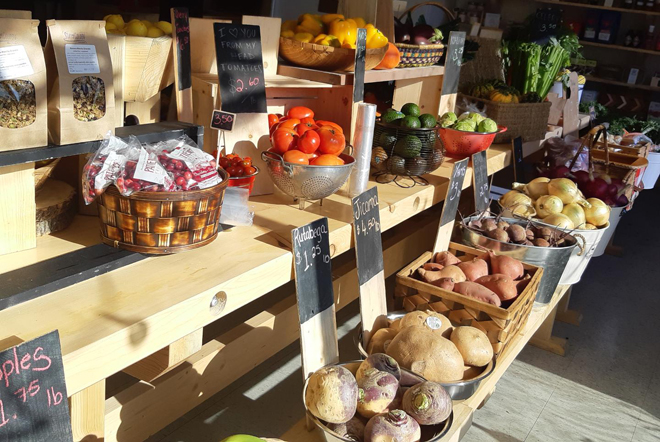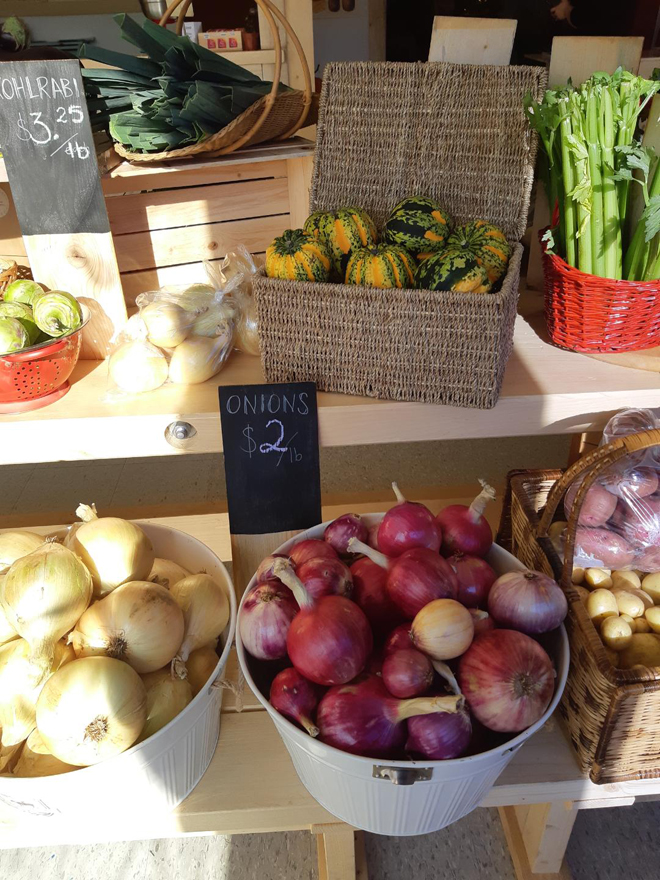By Terri Smith –
As you may not know, new regulations regarding organic food came into effect at the beginning of September. It would seem a small thing to many because to most people it’s really not that interesting. The new regulations are a part of one large new document called “New Safe Food for Canadians Regulations.” It is a hefty tome. The rule that concerns small-scale farmers is that the word “organic” is no longer allowed to be used to describe their growing practices unless they are certified.

The first I heard about the new rule was the first week of September. I was putting labels on the bins of local vegetables at work when I was told, “We can’t label anything as ‘organic’ anymore unless it is certified.”
“Okay?” I replied. “I never do that, anyway. What about ‘non-certified organic?’
“Nope,” I was told. “We can’t use the word ‘organic’ at all.”
I felt a bit flabbergasted. To me this is an important, descriptive way of talking about a producer’s growing methods. No one is making false pretenses; indeed, they are directly stating that they are not certified.
“Then I’m not going to label any of it, ” I responded. “That’s confusing because it looks like anyone who isn’t certified is spraying their veggies.”
I spent the rest of the day refilling bins of carrots and kale and myriad other vegetables in a sort of daze. I still identify as a farmer even though I am no longer farming for a living. I felt angry and dizzy, and my head was buzzing so that it seemed the voices of the people around me had to travel through a swarm of mosquitoes to reach my ears.
Later on we talk it over again. I was told I’m an anarchist and that’s why I don’t like the new regulations. This also angers me, and I’m not even sure why. I dropped the subject.
After agonizing over this topic for the past few weeks and talking it over with producers and non-producers alike, I am beginning to understand why this has upset me so much. First of all, anarchist or not, I do take issue with even more regulations for small-scale farmers. I dislike the ‘one-size-fits-all’ approach to food regulation, which tries to force small producers to comply with regulations designed for the large-scale, industrial growers.
I don’t like forced conformity. I don’t think a farmer should be forced to pay to prove they care about good growing practices. At first I refused to believe that we couldn’t use the term ‘non-certified organic.’ The word ‘organic’ does have a lot of meanings. In the context of food, Wikipedia describes it as, “food produced by methods that comply with the standards of organic farming. Standards vary worldwide, but organic farming in general features practices that strive to cycle resources, promote ecological balance, and conserve biodiversity.”
There are many other slightly different definitions of ‘organic’ out there, but what most people depend on is that, ‘organic describes certain practices of farming that would never include the use of chemical pesticides, herbicides, or fertilizers or the use of GMOs. When I was still a full-time farmer, I used the term ‘non-certified organic’ because I was trying to be as clear as possible; I was not making false claims about certification, and customers were welcome to get to know me and my farming practices, or buy from a certified farm instead, if they were so inclined. I was not trying to confuse anyone. There isn’t really any other word as easily understood as the word ‘organic’ to describe not spraying chemicals on the food you are growing.

As I said, I didn’t believe it until I read it for myself on the government website: “Some producers have begun to refer to their products as ‘non-certified organic’ because BC organic food and beverage products sold exclusively within the province do not have to be certified. This is confusing for consumers, and provides an unfair advantage to the non-certified operators.”
I don’t agree. I think using the term ‘non-certified organic’ is the opposite of confusing. But there we have it. The fine for non-compliance is $350.
I do want to say something about farmers who choose to certify. If I were certified I would probably not want anyone who wasn’t to use the word either because they didn’t pay for it. Is there another way those who are not certified could describe their growing methods that would be alright for everyone? How shall anyone not certified describe their farming practices? I don’t know what to say about it, really. I’m not trying to stir up trouble. I don’t think there is anything wrong with certifying; I’m just unsure why anyone who only sells locally bothers.
We thought when we began farming that we would certify after the first year when we had a bit more money. But on a farm where you are never making very much money there is always something that the $500 it costs per year to certify could be better spent on. The second year we put it towards our new tiller when the old one broke. The next year it was more drip line. Then our farm truck broke down. There was never a point where we thought, “Yeah, let’s give $500 to some random group so we can put a label on our food to prove that we are complying with some specific set of rules.” Because of all the definitions I just read for the word ‘organic,’ what stands out for me is this: “Standards vary worldwide.” Not just worldwide, either. They vary depending on which certifying body you choose. There are even approved pesticides you are allowed to use under the organic standards.
As we got to know more of the people in our community, we realized that what meant most to our customers was knowing us. If our food was being shipped far away then sure, a recognized set of standards would be needed. But for most of our customers or anyone who had ever heard us speak about food, they knew us. They knew how passionate we were/are about building our soil and growing the healthiest, most sustainable food we could possibly grow. We didn’t care about pesticides that were deemed acceptable; we wouldn’t use them anyway. I have only ever wanted to create the healthiest farm ecosystem I can possibly create. I only want to eat the freshest, healthiest food I can get.
I am bothered that a word from the English language has now been forbidden to anyone who doesn’t pay $500 for a stamp of approval to use it. I am also bothered that it doesn’t even necessarily mean what it is supposed to mean, as processed products claiming to be organic must contain only “95% organic ingredients” to be certified. And ‘organic’ products can still be pasteurized to death, refined beyond recognition, and sprayed with approved pesticides. And I’m not even talking about meat, yet.
So call me an anarchist if you want. I would rather trust a person who is my neighbour, certified or not, than believe a label designed for big business.
Maybe eating local is enough. Maybe calling our food, ‘local’ means more than calling it ‘organic’ anyway. Because if you’re buying food labelled “organic” as outlined in the new safe food regulations, what you end up with may be ‘organic,’ but whether or not it is still ‘food’ may be debatable.
Terri Smith is not entirely sure whether or not she is still a farmer. She does live on a farm where she grows most of her own food, and she does have very strong opinions about farming. She is passionate about building soil and growing non-conventional vegetables and is continually surprised that growing good food has become such a political act. She really enjoys teaching gardening workshops and she’s a bit of a vegetable nerd.
